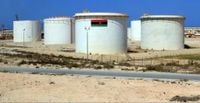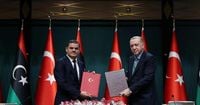On April 18, 2025, Engineer Karim Badawi, Egypt's Minister of Petroleum and Mineral Resources, met with Randa Naily, Chairman of Capricorn Energy, and Elianor Rawley, the company's CEO in Egypt, to discuss the company's activities in its areas of excellence in the Western Desert. The meeting, attended by Engineer Salah Abdel Karim, CEO of the Egyptian General Petroleum Corporation, focused on Capricorn Energy's future plans to intensify research, exploration, and production in the region.
During the discussion, Capricorn Energy announced its intention to ramp up exploration efforts for oil and gas in its designated areas, aiming to increase production significantly. Badawi emphasized the importance of an intensive research and exploration program being developed in collaboration with foreign partners operating in Egypt. He stated, "We aim to increase production of oil and gas and reduce the import bill," highlighting the need to overcome challenges and enhance partnerships to meet the ministry's goals of encouraging investment and boosting local production.
Naily, the Chairman of Capricorn Energy, echoed Badawi's sentiments, stressing the importance of cooperation and partnership in improving the investment climate and stimulating investor interest. She affirmed, "We are committed to working continuously to enhance investment opportunities and coordinate effectively with the ministry and the Petroleum Authority." This commitment comes as Capricorn Energy seeks to intensify its exploration activities in the Western Desert, which is critical for increasing Egypt's oil and gas output.
This meeting marks a significant step in strengthening collaboration between the public and private sectors in Egypt's energy landscape. As the country aims to bolster its energy independence, these discussions are pivotal in supporting sustainable development within the sector.
Meanwhile, across the Mediterranean, Libya has been making headlines as it reopens bidding for oil exploration after a hiatus of over 17 years. The announcement was made during a forum held in Istanbul, Turkey, attended by representatives from various oil and energy companies from Asia, Europe, and the Middle East. Masoud Suleiman, head of the Libyan National Oil Corporation, disclosed that 22 geographical areas are being offered for exploration, including 11 offshore locations.
Suleiman stated, "We have carefully crafted the contractual terms to provide a safe, balanced, and transparent investment climate that serves the interests of all parties." This initiative to resume exploration comes after a prolonged period of political and security challenges in Libya, which had previously halted such activities.
The Libyan government is eager to attract international investment, particularly from countries like Turkey, which has shown interest in collaborating on energy projects. Khalifa Abdul-Sadiq, Libya's Minister of Oil and Gas, has been actively promoting the nation's vast oil and gas reserves, which are the largest on the African continent. During a recent meeting in Istanbul, he invited international investors to explore opportunities in Libya, stating, "I extend to you an open invitation from Istanbul; I invite you to invest in Libya and contribute to achieving our visions in the oil and gas sectors."
These developments come at a time when Libya is striving to stabilize its political landscape and enhance its economic prospects through energy exploration. The government aims to leverage its geographical proximity to significant economic blocs, including Europe, to attract investment and boost production.
As Libya reopens its doors to international investors, the focus on creating a conducive investment environment is paramount. The government has emphasized its commitment to improving the legal and regulatory framework surrounding oil exploration to ensure transparency and security for potential investors.
In a related context, the Dabaiba government in Libya is working to strengthen ties with Ankara, particularly in the energy sector. This effort comes amid concerns about the potential rapprochement between Turkey and Khalifa Haftar, the military leader in eastern Libya. Recent discussions between Turkish officials and Haftar's representatives have raised questions about the future of Libya's political dynamics.
Turkey's involvement in Libya has been significant, particularly during the previous government's tenure. The Dabaiba administration is keen to maintain strong relations with Turkey, which has historically supported the Government of National Accord during conflicts with Haftar's forces.
As Libya prepares for its first bidding round in over a decade, the government is optimistic about attracting foreign investment to revitalize its oil and gas sector. The bidding process is set to commence on November 15, 2025, with contracts expected to be signed between November 22 and 30. This initiative is seen as a critical step towards restoring Libya's position in the global energy market.
Libya's current oil production stands at approximately 1.4 million barrels per day, according to the latest statistics from the Libyan National Oil Corporation. The country heavily relies on oil sales to finance its budget, making the revival of its exploration activities essential for economic recovery.
In summary, both Egypt and Libya are taking significant strides in their respective oil and gas sectors. Egypt's collaboration with Capricorn Energy aims to enhance production and reduce imports, while Libya's reopening of exploration bids marks a pivotal moment in its quest for economic stability. As both nations navigate their paths toward energy independence, the outcomes of these initiatives will be closely watched by international investors and stakeholders in the global energy market.






